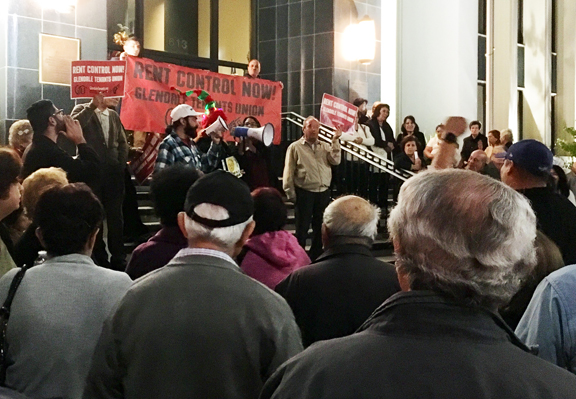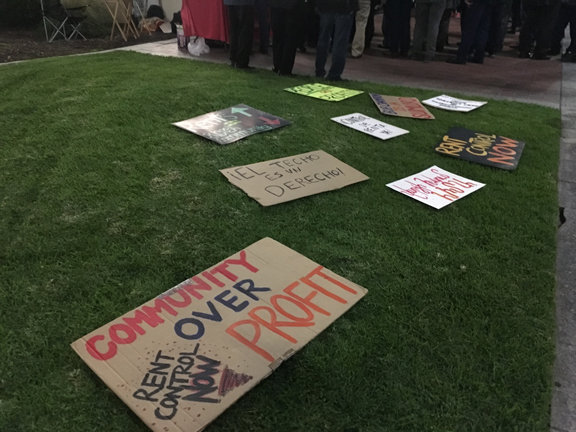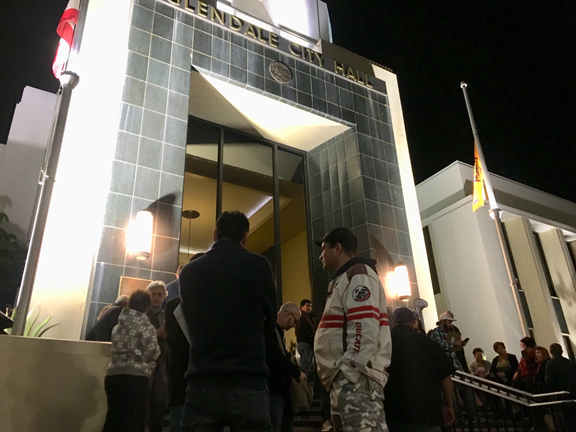
Members of the Glendale Tenants Union are among those gathered on the steps of city hall during Tuesday night’s Glendale City Council meeting after the Council chambers were filled to capacity.
By Julian MITCHELL, intern
Driving by the Glendale City Hall on Tuesday night, one could not help but notice the large crowd on the steps of city hall. The mass of over 100 people was gathered to protest the lack of rent control within the City of Glendale.
“Shame on the greedy landlords!” chanted the crowd.
Hours later, at 12:45 a.m., the Glendale City Council approved a two-month rent freeze by a 3-1 vote that will go into effect in 30 days on Dec. 27 and end on Feb. 27, 2019. Discussion leading to the vote included imposing a six-month moratorium on raising rents in the City of Glendale, then reducing that to three months. Upon the realization that a 30-day notice needs to be given prior to rents being raised, it was decided that a two-month freeze would be in line with the Council’s goals.
Councilman Ara Najarian recused himself due to a conflict of interest and Councilwoman Paula Devine was the single vote against it. Had Devine not voted against the freeze, it could have gone into effect immediately.
“Rent control is not the solution,” said Devine.
Within city hall, a smaller crowd had overflowed into the lobby as the city council chambers had been filled to capacity. According to Hayk Makhmuryan, a leader with the Glendale Tenants Union, many of the seats were filled almost immediately with Glendale landlords. Outside, Makhmuryan and his group had gathered to bring to the Council the perspective of the renters.
Due to the diversity of the crowd, messages from leaders were required to be said in Armenian, English and Spanish. According to Makhmuryan, over half of the groups’ supporters are elderly as well.
The city council meeting on Nov. 13 lasted over eight hours with the focus being on local housing and rent control. According to Glendale Tenant Union member Karin Sidi, that meeting was “all talk.” However, Mayor Sinanyan stated that the Council has been discussing the issue for over two years.
“It’s more than two years,” said Sinanyan. “It’s people’s lives being displaced.”
The proposed rent control would limit raises in rent to 7% annually. Discussion on the subject was pushed on Tuesday to the end of the meeting forcing it to extend past midnight.
In a statement released by the City, generally, for tenancies commencing on or prior to Sept. 18, the ordinance will require landlords in multifamily units to limit the rents they charge during the rent freeze period to no more than the rent they were charging for a unit on Sept.18 plus 5%. For tenancies commencing after Sept. 18, rents may not exceed the rent at initial tenancy plus 5% during the rent freeze period.
The only agreement among Council members was that it did not have enough time to pore over all issues and come up with a plan to handle rent concerns. In order to provide some stabilization, most of the night’s debates were focused on a possible three-to-four month rent freeze, although Council ended up agreeing on only a two-month freeze.
“I’ve had landlords email me saying that they will be forced to raise rents to cover expenses if there is a rent freeze,” said Devine.
Councilman Vrej Agajanian was in favor of a four-month rent freeze to give the Council time to figure out a better answer for the troubles of tenants within Glendale, while Councilman Vartan Gharpetian felt this extended the issue too long.
“It needs to be immediate,” said Makhmuryan regarding the rent freeze.
Makhmuryan also stated he thinks additional protections for renters need to be in place and that by itself rent control cannot be as effective.
In November, voters voted on Proposition 10, a rent control measure that would loosen state regulations on rent control. Although voters did not approve the measure statewide, many cities did approve Prop 10 by a 1%-3% margin, including the cities of Burbank, Glendale and Pasadena.
Glendale attempted to tackle a similar issue in March, voting at that time not to enact a right-to-lease ordinance. The right-to-lease ordinance, which is now back in discussions as a result of the rent control talks, would force landlords of apartment complexes with five or more units to offer all tenants one-year lease agreements. After that, owners could raise rents and tenants would be given the option to opt into a second year. The goal of the right-to-lease would be to stabilize rents for at least one-year, providing financial stability and a firm future for tenants. The Council approved further discussion in February of a right-to-lease ordinance.
Mayor Sinanyan said he is worried that Council talks of rent freezes on a governmental level cause “kneejerk reactions” by landlords who would increase rents due to the Council discussions. Once the two-month moratorium is over, rents can be manipulated as normal.
Many landlords said they were worried that rent control would not fix anything, and stated that they were only increasing rent nominally or hardly at all.
“I am a small mom-and-pop landlord; I haven’t raised my rent in 10 years. We’re not all the same,” said Martha Login, a Glendale landlord.
Shant Norhadian, a landlord representative, stated to the Council that rent control would “undermine the progressive policies” of Glendale that have caused economic and population growth in the city. Additionally, Norhadian stated that without revenue from rent, landlords would be unable to repair and improve properties.
According to a study of rent control in Massachusetts from the Journal of Urban Economics, rent control results in a decrease of available rental units and a decrease in unit maintenance, as well as lowering rent in surrounding uncontrolled areas and increasing the duration of tenants’ residency in the controlled units.
The Glendale City Council meets Tuesdays at 6 p.m. and meetings are streamed online at the Glendale City Council website, in addition to being broadcast in the city hall lobby and at the Glendale police station auditorium.


